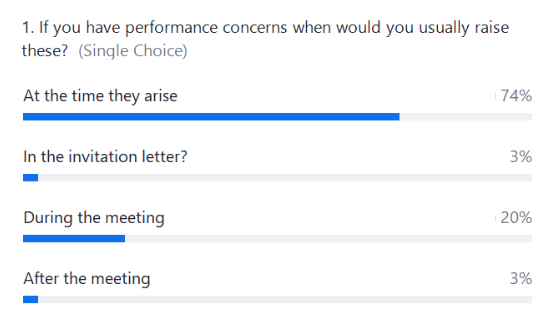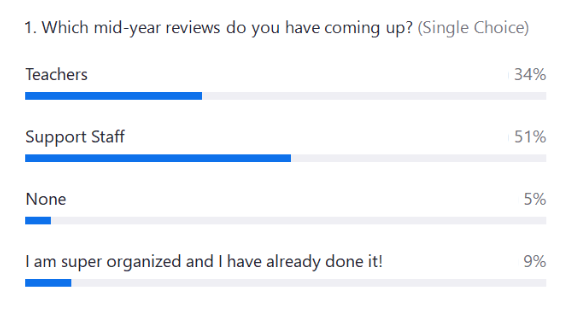
Employment Law: Top Tips for Mid-year Appraisals (where there are concerns about performance)
subscribing to our newsletter
Polls 1
Poll 2

When do you raise concerns?
Firstly, you do not have to wait for the mid-year review point to address concerns. Ideally, these are to be addressed and support put in place as soon as possible when concerns come to light. However, when this has not happened for whatever reason, the mid-year review point will give the school or Trust a further opportunity to identify and address concerns.
Should this be during the meeting? After the meeting in the follow-up letter? In the invitation letter?
The best practice is to address concerns as soon as they are identified and do so in person where possible. Having open, ongoing feedback will ensure staff are used to receiving praise and support regularly, meaning more challenging concerns may be easier to address as employees will expect to receive feedback.
Failing this, we advise you share the concerns within the meeting, but do not set these out within the invitation letter. If you write to an employee who has no idea there are concerns, setting out the negative feedback, they are more likely to refuse to attend, go off sick or ask for union representation at that meeting.
None of these will prove conducive to working together in addressing these concerns. It may unduly delay the meeting, which may generate more anxiety and worry for the employee and you as their manager.
Recommendations for giving feedback
There are lots of ways to give feedback, and every manager will have their own style. However, there are few skills that might support you when you have concerns to address. No one likes to be told they have flaws or are not meeting their targets, but you will need to have these difficult conversations from time to time.
Feedback should be:
-
Constructive: Offer specific, actionable feedback that highlights both strengths and areas for improvement. Focus on behaviours and outcomes rather than personal attributes. Use the "sandwich" method, sandwiching constructive feedback with positive feedback to soften the impact and maintain motivation.
-
Centre around Goals/Targets: Collaboratively set SMART (Specific, Measurable, Achievable, Relevant, Time-bound) goals with the employee for the upcoming performance period. Ensure that goals are aligned with organizational objectives and the employee's role and responsibilities.
-
360-Degree: Incorporate feedback from multiple sources, including peers, subordinates, and other relevant bodies, in addition to the manager's assessment. 360-degree feedback provides a more comprehensive and well-rounded view of the employee's performance and can identify blind spots or areas for development that may not be apparent from a single perspective.
-
Strengths-Based: Acknowledge and celebrate the employee's strengths and achievements during the performance period. Encourage them to leverage their strengths in their work and identify opportunities for further development and growth.
-
Developmental: Offer guidance and support for areas where the employee may need to improve or develop new skills. Provide resources, training opportunities, or mentoring to help them address skill gaps and reach their full potential.
-
Timely: Provide feedback on a regular and ongoing basis throughout the performance period, rather than waiting until the annual appraisal. Timely feedback allows employees to course-correct and adjust in real time, leading to continuous improvement.
-
Open: Encourage open and honest communication during the appraisal discussion, creating a safe space for the employee to share their perspectives, concerns, and aspirations. Actively listen to their feedback and incorporate it into the discussion as appropriate.
-
Recognition: Express appreciation for the employee's contributions and achievements during the performance period. Recognise their efforts and accomplishments and show gratitude for their dedication and hard work.
-
Evidence based: It is important to have evidence to support your feedback, even more so where there are concerns and we will touch on the evidence needed in the next part of the session.
By incorporating these methods within the mid-year review, you can provide meaningful feedback that supports employee development, enhances performance, and addresses the concerns you have identified.
What evidence will you need?
For example, when preparing for a mid-year review meeting with a teacher where there are performance concerns, it's crucial to gather evidence to support your observations and assessments.
Here's a checklist of evidence you may need to collect as a manager:
-
Lesson Observations: Schedule and conduct observations of the teacher's lessons. Take detailed notes on aspects such as classroom management, teaching methods, student engagement, and delivery of curriculum content.
-
Student Work Samples: Review samples of student work to assess the quality and progress of learning in the teacher's classes. Look for evidence of achievement, understanding, and areas for improvement.
-
Assessment Data: Analyse assessment data, including test scores, assignments, and other evaluations, to gauge student performance and identify any trends or patterns that may indicate areas of concern.
-
Parent or Guardian Feedback: Consider any feedback received from parents or guardians regarding their perceptions of the teacher's effectiveness in supporting their child's learning and well-being.
-
Professional Development Records: Review the teacher's participation in professional development activities, such as workshops, training sessions, or courses, to assess their commitment to ongoing learning and improvement.
-
Performance Goals and Objectives: Refer to the teacher's established goals and objectives for the year and assess their progress toward meeting these targets.
-
Documentation of Concerns: Compile any written records or documentation of specific concerns or incidents related to the teacher's performance, including disciplinary actions, complaints, or unresolved issues.
-
Any Relevant Policies or Procedures: Familiarise yourself with the school's policies and procedures related to performance evaluation and support, ensuring that your actions and decisions align with established guidelines.
By collecting and reviewing these types of evidence, you'll be better equipped to conduct a comprehensive mid-year review meeting with the teacher, identify areas for improvement, and collaboratively develop strategies for addressing any concerns while supporting their professional growth.
When to move to a formal capability process?
Moving to the formal capability process is a significant step that should be taken only after careful consideration and adherence to specific procedures outlined in your school or trust’s policies and procedures, as well as statutory regulations.
Here are some indicators that may suggest it's appropriate to initiate the formal capability process:
-
Repeated Performance Concerns: Despite supportive interventions and opportunities for improvement, the employee’s performance continues to fall below the expected standards over an extended period.
-
Failure to Meet Targets: The employee consistently fails to meet the performance targets or objectives set during performance management or other review processes.
-
Concerns Raised by Multiple Sources: Performance concerns are consistently raised by colleagues, students, parents, or School Improvement Partners, indicating a pattern of underperformance.
-
Lack of Progress: Despite receiving feedback, support, and targeted interventions, there is little or no evidence of improvement in the empoloyee's performance over time.
-
Impact on Students: The employee's underperformance is harming student progress, learning outcomes, or well-being, as evidenced by assessment data, observations, or feedback.
-
Serious Breach of Professional Standards: The employee's conduct or behaviour raises significant concerns about their suitability to continue in their role, such as breaches of safeguarding policies, professional ethics, or legal obligations.
-
Unwillingness to Engage in Supportive Measures: The employee demonstrates a lack of commitment or willingness to engage constructively in the support and improvement process, despite being provided with opportunities and resources.
Before initiating the formal capability process, it's essential to ensure all reasonable steps have been taken to support improvement through informal measures, such as coaching, mentoring, training, and regular feedback. Additionally, it's crucial to adhere to the procedural requirements outlined in the school or Trust’s capability policy including providing the employee with written notice of concerns, clear performance targets, opportunities for representation and appeal, and access to support and representation throughout the process.
Additional Info
Upcoming Training
As mentioned in the sessions our Employment Law and HR Team have the following sessions coming up which may be of interest:
CPD Accredited Courses:
Managing Long Term Sickness Absence – Thursday 7th March 2024 at 9.30am – 1.00pm
Managing Capability with the Education Sector – Thursday 14th March 2024 at 9.30am – 1.00pm
A Practical Guide to Disciplinary Investigations – Thursday 21st March 2024 at 9.30am – 1.00pm
Breakfast Briefing – ‘Directed time and part time staff’ – Friday 22nd March 2024 9.30am – 10.15am
Helpful Info:
If you’d like to review Judicium’s forthcoming sofa sessions for next term please click here
Follow us on Twitter: @JudiciumEDU
© This content is the exclusive property of Judicium Education. The works are intended to provide an overview of the sofa session you attend and/or to be a learning aid to assist you and your school. However, any redistribution or reproduction of part or all of the contents in any form is prohibited. You may not, except with our express written permission, distribute or exploit the content. Failure to follow this guidance may result in Judicium either preventing you with access to our sessions and/or follow up content.
Related content
.png)
This blog is based on Judicium’s Safeguarding ‘Sofa Session’ from the 25 April with our resident expert Sarah Cook.

This blog is based on Judicium’s Health and Safety ‘Sofa Session’ from the 24th of April, with our resident expert Marta Zydel.

This summary is based on Judicium’s Employment Law ‘Sofa Session’ from the 17th of April, with our resident expert Paul Luffman LLB (Hons), L.P.C.
.png)
This is a summary taken from Judicium’s DPO ‘Sofa Session’ from the 20th of March with Data Services Consultant Patrick Ballantine.
.png)
This blog is based on Judicium’s Health and Safety ‘Sofa Session’ from the 14th of March, with our resident expert Jamie Ashard, LLB (Hons), GradIOSH, DipNCRQ.
This blog is based on Judicium’s Safeguarding ‘Sofa Session’ from the 13th of March, with our resident expert Joanne Bocko.



Sofa Sessions | Safeguarding